- Home
- Jean Stone
A Vineyard Christmas Page 4
A Vineyard Christmas Read online
Page 4
Silence.
At last.
Less than an hour had passed since Annie had opened the door and found the unexpected gift, yet she felt as if she’d run a marathon. She leaned back, closed her eyes, and savored the warmth of Bella’s little body resting against her, the little heart beating a gentle thump-thump. The silence felt blessed, as if the drama had been worth the wait.
Annie had wanted to have children. But her first husband, Brian, had been killed in an accident when he was only twenty-nine and a drunk driver slammed into him. Both Annie and Brian had been elementary school teachers, devoted to kids, helping them learn, watching them flourish, the little people growing into distinct individuals. She and Brian would have had several wonderful children, born out of love and joy. That had been their plan.
As for her second husband, Mark, well, he had seemed like a good idea at the time.
Mark had come in a great-looking package that Murphy had warned her to be wary of. But by then both of Annie’s parents had died, too, and she wanted more in her life than teaching, more in her life than emotional pain. And heavy-duty loss. She wanted to have fun, which Mark was terrific at providing.
But whenever she brought up the subject of kids, he said, “Not yet, hon, okay? I want to feel financially secure before we bring kids into this crazy world.”
Like everything else he’d said, she’d believed him, silly her.
Mark was in real estate, buying and selling commercial properties, garnering deals all over the world. They lived in a big, beautiful apartment on the affluent Brookline-Boston city line—the kind of address where she’d never thought that she would live. Annie was, after all, a middle class kid who’d gone to a state college and had reached her childhood dream of teaching eight- and nine-year-olds.
And though she’d never craved costly clothes, she soon amassed an enviable wardrobe. Mark bought her a “luxury” car, and, at his suggestion, she hired a twice-a-week cleaning woman. Annie had regular mani-pedis and needless massages and often accompanied her husband to client dinners, where she enjoyed the gourmet food and the imported wine and laughed at anecdotes she tried to tell herself were amusing. A few times, during school vacations, she traveled with him and brought back items to show her students: a silk shawl from Thailand, a Carnival costume from Brazil; French Santon figurines from Provence.
Caught up in the whirlwind of busy, busy days and nights, Annie had been tricked into thinking her marriage was solid. She “ran” the household because she was home more often than Mark; he handled their finances because he made lots of money and was “so good” with it.
But, as Murphy often reminded her, tempus fugit. Time flies.
Before Annie realized the impact of that warning, she had turned forty, her chances for children rapidly diminishing. Then, one afternoon, Mark called from his office.
“I’ll be tied up tonight, babe. Probably late.”
For some reason that Murphy later referred to as primal instinct, when Annie hung up that day, she had a sudden vision of thousands of red flags, the warnings she’d been denying that something in their world was—had been from the beginning—terribly wrong for her. She clutched her stomach, skipped dinner, and went to bed at seven thirty.
Her primal instinct had been right. Mark did not come home that night. Or any night thereafter. By the time Annie filed a missing persons report, he was gone. Very gone. The only thing the police learned was that he’d left a tsunami of debt—all of which he had put in Annie’s name. That’s when she knew it was time to stop crying and find a solution. She was too embarrassed, and had too much pride, to file bankruptcy.
After years of hard work and determination, she’d finally paid off the debt with the advance from her last book. Through it all, she’d forged ahead, and, most importantly, she’d kept smiling. As her dad had often said, “It’s hard to cry when you wear a smile.”
Bu now, with this baby, this warm, tiny stranger resting against her, Annie felt consumed by loss. She rocked back and forth, wondering how she could have lost something she’d never been allowed to have: a child like this, one who needed her not just for sustenance and care, but for love and nurture, if only for a couple of days.
With gentle tears and a tender aching in her heart, Annie pulled Bella a little closer and bent her head to hers. After a while, she closed her eyes and, like Bella, she fell asleep.
Chapter 4
Francine ate her last protein bar. She’d tried to hold off a while longer, but she couldn’t help herself. She was hungry. Starved. Who knew she’d get caught in a blizzard? Who knew it would snow so damn long?
Who knew anything anymore?
Like what she should do next.
Like where she should go.
Like why she was still there.
She shivered. From the upstairs window, she could see . . . nothing. Except swirling, twirling white stuff blinding her view.
She huddled back under two white comforters that probably cost more than she’d made in a month waiting tables at the Sunrise Café. She didn’t care that they smelled musty. It was a smell she’d grown used to, having spent so much time on the Cape.
Sooner or later, she’d need more food. And she’d have to figure out her next move. She wondered how long she could survive without eating again. Or drinking. She hadn’t planned it this way. But the storm had started too soon. And she’d been trapped on Chappaquiddick because she’d assumed the ferry had shut down.
If she couldn’t find something else to eat, starving to death might be a solution. Out here, no one would find her until summer, when whoever owned the house she’d broken into and where she was camped out would arrive for the season in their Range Rovers and BMWs, with their kids and their big dogs and their attitudes. The “attitude of entitlement,” they called it at the Sunrise. She supposed it was worse on the Vineyard because of all the gigantic houses she’d seen from the water. Like the one where she was hiding now.
Back home, her father hadn’t been very good at feeling entitled. He had never reached his full potential, she’d heard her grandfather shout at him before the old man died, though not before he’d cut them all out of his will: her father, her mother, and her.
Francine had always known she’d never been entitled. The fact that she now had only eighteen dollars left to her name was proof positive of that.
At least she knew Bella was safe now. And better off without her.
* * *
Hours later, Annie awoke with a kink in her arm, a crimp in her back, and an unfamiliar stirring on her chest. It took a moment for her to realize it was . . . Bella. The cuddly baby who had shown up in the night.
“Who are you?” Annie whispered. “And how did you wind up in my lap?”
She thought about the young woman—the girl—from the fair. “How much?” That was all Annie had heard her say. Had she wanted to buy Annie’s soap to give as a Christmas gift? Except for the baby, she’d been alone. No girlfriend, no boyfriend, no one who might have been her mother. Or sister. Or grandmother named Bella, which might mean something. Or nothing. There was only the note and its pleading words:
Please take care of her for a couple of days . . .
But how long was a few days? And where was the rest of the baby’s family? Did she only have her mother? Her name might be a lead, but Annie doubted if she Googled BELLA, MARTHA’S VINEYARD there would be many hits.
In a feeble attempt to put those concerns aside, Annie stood up, miraculously not dropping the baby. She stoked the fire, heated a bottle, and fed and changed Bella, almost, she thought, with the ease of a true new mother.
“Applause, please!” she instructed Murphy, who she hoped was still hiding up in the ceiling.
When Murphy did not cooperate, Annie lifted tiny Bella’s hands and clapped them together, while oohing and aahing the way adults often did that made them look ridiculous but that babies seemed to relish.
The rest of the day passed in a blur. Bella slept often, fo
r which Annie was grateful, though she would not have minded spending more time holding her. But Annie was productive: She dusted the cottage, which did not need dusting. She ironed a few shirts, which did not need ironing. She tried to read, but could not get engaged. She did not attempt to write.
Between tasks, she checked the snow accumulation (a lot, and still not winding down), the wind velocity (still high), and the possibility that phone service had returned (it had not). But, whether she liked it or not, her worries overrode her concentration. Would the formula outlast the storm? Would the diapers? And—worst of all—what if the mother had no real intention of returning?
Beneath those practical questions, though, one greater conundrum lurked: Why Annie?
But no matter what the questions, or the answers, Annie knew that Bella did not belong with her. Bella was a living, breathing little baby, not a stray cat to whom Annie should give shelter. When the storm was over, if the young mother didn’t show up first, Annie would tell Earl the story, and he would help bring Bella to the police.
When the snowy light of day slipped into the darkness of late afternoon, Annie heated stew for dinner and some cereal for the baby, who had already gone through half of the formula. She tried not to dwell on the sizable dent that had been made in the pack of diapers. Instead, she prayed that they’d sleep through the night and be greeted by a sunny morning and the missing mother standing on the porch. It would be a happier ending than seeing Earl standing there.
Bedtime arrived with no sign of the storm abating or of help arriving, so Annie carried the basket into the bedroom. She feared the floor might get too cold in the night if she set the basket there, but with its lovely curved base, an elevated spot no doubt would be dangerous. Then she focused on the nightstand. Pulling open the bottom drawer to provide support, she emptied the middle one, lined it with the fleece blanket, and snuggled Bella inside. Perfect. Annie put on her pajamas, went to bed, turned off the lamp, and closed her eyes.
And the baby started to cry.
Annie sighed. “You win. Let’s read.”
A copy of every novel she’d written sat beside her bed for nights when sleep refused to come. Turning onto her side, she reached over and grabbed one—her first: You Let Me Go.
“Well, this is appropriate,” she said with a laugh. “In a dark-humor kind of way.”
Bella responded with a tiny wail.
Opening the book, Annie turned to the prologue. It had been a long time since she’d read what truly was the closest she had come to an autobiography. She ran a finger over the words, remembering how she’d struggled to get started, to keep it simple yet engaging. And realistic at its core.
She looked over at Bella again: the cries had ceased, and the baby stared at Annie, as if she were poised to listen, eager to hear a sliver of what her future might hold if her mother went back on her word.
Annie cleared her throat, returned to her book, and read:
I was the only kid in my class who was adopted. When I was in fourth grade, I thought that was cool. I hadn’t yet considered that my real parents hadn’t wanted me. Then, one day on the playground, Bobby Briggs told me they hadn’t.
She read the first chapter, then moved on to the second. It was fiction—well, some of it. Bobby Briggs had been real, but she’d changed his name. And though time had tempered the trauma of that day on the playground, her doubts about herself and her feelings of but-what-if-she-had-kept-me had taken longer to fade. But they had. Writing the book had helped purge her of the rest of those emotions, bringing closure and, more importantly, forgiveness.
With those comforting thoughts, and Bella quiet again—her eyes closed, her breathing steady and calm—Annie put the book back on the nightstand. Then she turned off the light and slid under the comforter. But it was hours before she fell asleep.
* * *
By morning, the snow had finally stopped; sunlight filled the cottage with welcoming warmth. The only thing missing from Annie’s wish list was Bella’s mother standing on the porch.
Annie had been up for a while. She’d already changed and fed the baby, who was back in the basket on the floor by the Christmas tree. Coffee perked on the woodstove; Earl would arrive momentarily to plow the driveway. She’d heaped cinnamon rolls onto a plate so he could enjoy one or two while she told him a story he might not believe. After that she would wrap up little Bella, and they’d go off to the police station with Earl. Then she would get back to her baby-free life.
She was peering out the window, watching for Earl, when Bella giggled. Annie turned and saw that the baby was laughing and smiling, wiggling her little arms up toward the unadorned branches of the tree. After she’s gone I’ll have time to decorate, Annie thought. It was too bad Bella wouldn’t be there to see the results.
“You’re such a sweet little girl,” Annie said. “I’m sure that the nice police officers will take good care of you, and your mommy will be back soon. And hopefully you won’t have to put up with a bully when you reach fourth grade.”
Then, in an instant, like the day that Mark had called to say he’d be home late, a sick premonition washed over Annie, the taunting words of Bobby Briggs jumping into her mind:
“If you weren’t so ugly and skinny and stupid,” Bobby said, “your real mother would have kept you.”
The memories rushed back of the pain that had gripped her heart and head and stomach and had come all at once, causing her to throw up right there in front of all the other kids.
Though nearly forty years had passed, Annie once again felt those same sensations. As her gaze drifted down to Bella, she could almost hear the taunts of the other kids on the playground, she could almost see their fingers pointing at her, she could almost hear their high-pitched laughs. Pressing a hand against her throat now, Annie tried to breathe, her stomach rumbling and tumbling the way that it had on that awful day.
Her mother hadn’t wanted her.
Despite Annie’s hard work to purge and to forgive, that was a truth that would not go away.
Just then Earl’s pickup crunched down the driveway, its narrow plow blade slicing into the snow, pushing it to one side. That’s when Annie knew she could not tell him about Bella. If he took the baby to his son, John, the police officer, John would put Bella in protective custody, because what kind of mother would leave her baby with a total stranger, let alone during a nor’easter? Bella had been cold out on the porch.What if she’d died of hypothermia before Annie had found her?
Annie began to hyperventilate.
Once John had the baby, he no doubt would not wait the “couple of days” for the mother to come back on her own. He’d set Bella up in foster care, and she’d be in the dreadful “system.” When Annie had been a teacher, she’d seen kids that had happened to. Some were fine, but others . . .
And though Bella’s mother had been irresponsible, would she be given any credit for being too young to know better?
The predictable answer was: No.
Nor would there be any assurance that Bella would not be left to wonder if her mother had given her up because she was ugly. Or skinny. Or stupid.
Watching Earl’s plow clear away the remnants of the storm, Annie knew she wasn’t ready to give up on Bella’s mother either. If Annie could find her first, maybe she could reunite her with the baby before any real damage was done.
When the pickup churned to a stop at the stairs that led onto the porch, Annie pushed open the door, stepped outside, and waved.
Earl rolled down the window and said, “Morning!”
She took a deep breath, the crush of her memories slowly easing. “Morning, yourself! Nice day, isn’t it?”
“Peachy. You got coffee on?”
Annie stood on one foot, then the other, and prayed Bella wouldn’t let out a scream. “Actually, I’m sorry, but I ran out. And I’m so busy working, I haven’t bothered to worry about it.”
“Good thing you charged up your computer last night.”
“What?”
“Your computer. I said it was a good thing you charged it up last night. Power’s out. Or haven’t you noticed? Went out at six this morning.”
She shook her head. “No. I was still asleep. The woodstove kept us cozy through the night.” She flinched right after she said us. Earl looked at her oddly, but didn’t ask if she was alone. Maybe he thought that a man—a lover?—had come from out of nowhere and was camped out inside.
“Well, then,” he said, “I’ll finish up here and be on my way. Lots of driveways to take care of. Not that any of the owners will be here until June, but gotta keep ’em clear in case of emergency.”
She nodded. “Right. See you later then. And thanks.” She closed the door, leaned against it, and let out a long, lingering sigh. Then she moved over by the Christmas tree, picked up Bella, and held her close for a long time.
* * *
Annie decided to stay in for the rest of the day, to keep out of Earl’s sight. Even if he were plowing driveways on the other side of Chappy, she could not take the risk. And she needed to be home in case Bella’s mother came back.
But in order to remain sequestered, Annie had to figure out how to improvise with the dwindling baby supplies.
When she finally put Bella down for an afternoon nap, Annie prowled through the refrigerator, hunting for some type of “people food” that a three-to-six-month old could digest. Certainly not the stew, the freshly baked brownies, or the cinnamon rolls. She did have sweet potatoes—maybe she could cook one and mash it with the old-fashioned, handheld eggbeater that she’d seen in the utensil drawer. Then she remembered she had a few bananas—hadn’t Murphy mashed bananas for her boys? Was it worth a try? Or would it harm Bella?
She shook a frustrated fist up to the ceiling. “Help!” she cried in a low whisper, so as not to wake up Bella.
When Murphy didn’t reply, Annie peeled a banana, dropped it into a bowl, and started mashing. Somehow, the fruit seemed like a safer bet than the sweet potato. She congratulated herself on that sensible assessment.

 A Vineyard Morning
A Vineyard Morning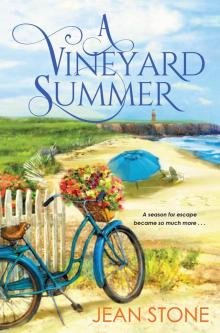 A Vineyard Summer
A Vineyard Summer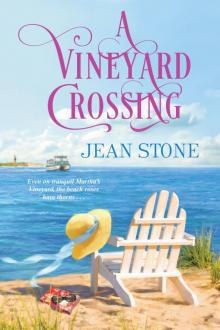 A Vineyard Crossing
A Vineyard Crossing A Vineyard Christmas
A Vineyard Christmas Beach Roses
Beach Roses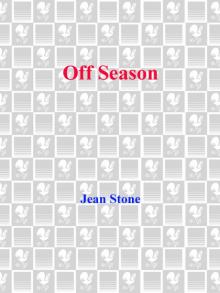 Off Season
Off Season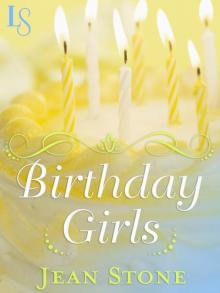 Birthday Girls
Birthday Girls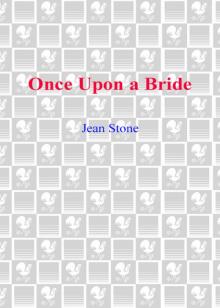 Once Upon a Bride
Once Upon a Bride Places by the Sea
Places by the Sea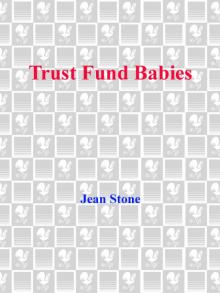 Trust Fund Babies
Trust Fund Babies The Summer House
The Summer House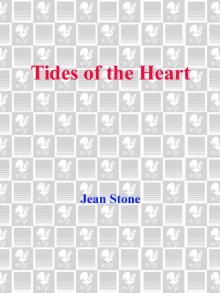 Tides of the Heart
Tides of the Heart Sins of Innocence
Sins of Innocence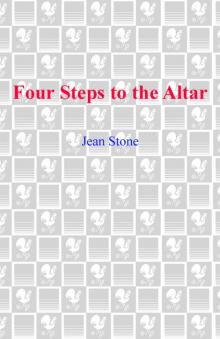 Four Steps to the Altar
Four Steps to the Altar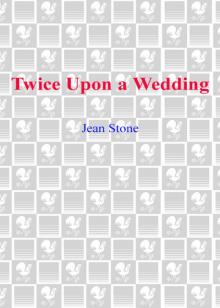 Twice Upon a Wedding
Twice Upon a Wedding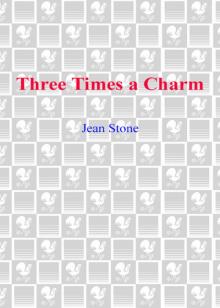 Three Times a Charm
Three Times a Charm